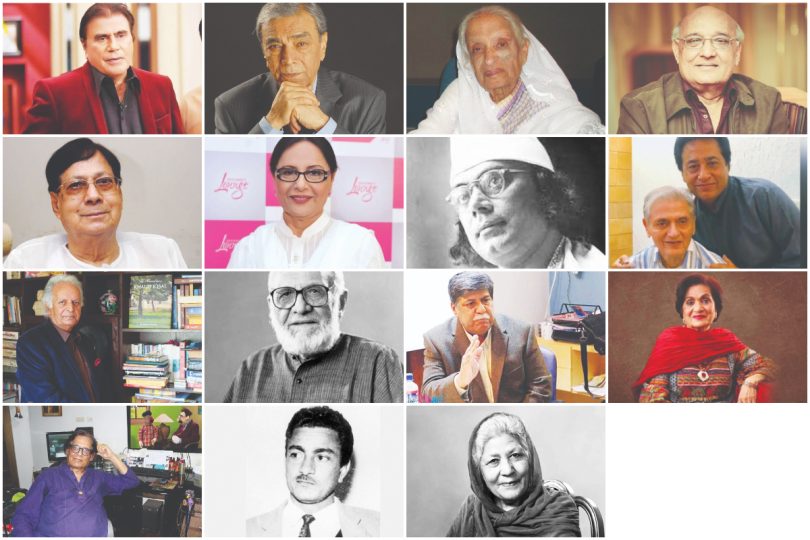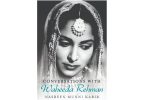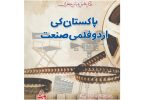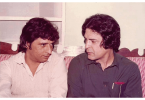On the occasion of Pakistan’s 75th Independence Day, BOLD brings its tribute to a close with a look at the final 20 iconic film and TV personalities of the country
Pakistan’s entertainment industry is not just indebted to its actors, singers, and music composers but also to the many individuals who either stayed behind the scenes or conducted themselves to perfection in front of the camera. These individuals could be the anchors (aka hosts, comperes) who dominated the scene with their impressive oratory skills, their amazing vocabulary, and their connection with the audience, or those who chose their pen to do their bidding.
And then there were those who decided to call the shots and make the film industry in the country stand on its feet during the last 75 years. Read on about the best of the rest, who became legends in their lifetime because of their legacy, and because their work is still being followed by those who chose to emulate them.
The ‘anchors’ who provided the base for others
TV transmission began in Pakistan on 26th November 1964, and it was Tariq Aziz who announced the arrival of the new medium in what went on to become his traditional style. He was a radio broadcaster, a film actor, a poet, and a politician, but he remained known around the world for his exploits on TV. From 1974 till 2020, the show was PTV’s most-watched programme, and could easily be termed the most popular game show ever produced in the country. The way he conducted the show, the manner in which he introduced his guest, and his ability to interact with the public made him an icon during his lifetime.
Now Reading:
Remembering the icons – III

On the occasion of Pakistan’s 75th Independence Day, BOLD brings its tribute to a close with a look at the final 20 iconic film and TV personalities of the country
Pakistan’s entertainment industry is not just indebted to its actors, singers, and music composers but also to the many individuals who either stayed behind the scenes or conducted themselves to perfection in front of the camera. These individuals could be the anchors (aka hosts, comperes) who dominated the scene with their impressive oratory skills, their amazing vocabulary, and their connection with the audience, or those who chose their pen to do their bidding.
And then there were those who decided to call the shots and make the film industry in the country stand on its feet during the last 75 years. Read on about the best of the rest, who became legends in their lifetime because of their legacy, and because their work is still being followed by those who chose to emulate them.
The ‘anchors’ who provided the base for others
TV transmission began in Pakistan on 26th November 1964, and it was Tariq Aziz who announced the arrival of the new medium in what went on to become his traditional style. He was a radio broadcaster, a film actor, a poet, and a politician, but he remained known around the world for his exploits on TV. From 1974 till 2020, the show was PTV’s most-watched programme, and could easily be termed the most popular game show ever produced in the country. The way he conducted the show, the manner in which he introduced his guest, and his ability to interact with the public made him an icon during his lifetime.



Although Zia Mohyeddin made his name abroad as an actor of repute, be it in theatre, film or TV, his Zia Mohyeddin Show in the 1970s is considered the pioneer of talk shows in the country where he carried himself so elegantly that people started imitating him. It was his show that introduced many individuals to the entertainment industry including comic Moin Akhtar and others but none became as famous as the Zia Mohyeddin Show product like Khushbakht Shujaat. The tall, and graceful Khushbakht burst on the scene as a student who questioned film actor Mohammad Ali regarding the standard of films, and the rest is history. She went on to host memorable shows on PTV till the 1990s and be it the election transmission, the PTV Milaad, or a talk show, she was always in her element.
And then there was the legendary novelist, writer, and actor Mustansar Hussain Tarar who brightened the morning of an entire generation as the eternal Chacha Jee. When PTV started its morning transmission in the late 1980s, it was Mustansar Hussain Tarar who, due to his popularity among elders and his familiarity with kids, turned it into a smash hit. Every day the kids used to listen to Chacha Jee instead of their parents who promised to show them a Bangar Billay Ka Cartoon if they finished their breakfast promptly in return. Even today, after he has bid adieu to morning shows, Mustansar Hussain Tarar remains everyone’s Chacha Jee who has something valuable to offer.
The writers with the Golden pen!
After independence from the British rule, India gained many intellectuals compared to Pakistan because many decided to stay back in the Hindu-dominated country and the newly-created state had to produce its own intellectuals. Some led by Fatima Surayya Baiia who herself migrated with her family from India, chose to make TV their platform and educate the audience through it. She was not just successful as a playwright who adapted popular novels into TV dramas but also as someone who had the solution to every problem. Legendary TV personality Agha Nasir once said that people who had problems would approach Bajia rather than the head of the organisation because they believed in her.



While Bajia was busy in the Karachi TV station after starting her career in Islamabad, literary giants Ashfaq Ahmed and Bano Qudsia adopted the Lahore TV station as their own. Ashfaq Ahmed’s Aik Mohabbat Sau Afsaney is considered to be an iconic TV series while Bano Qudsia’s novels and plays were adapted for TV during the 1980s and the 1990s. The husband-and-wife duo appeared in countless TV shows where they satisfied the intellectual curiosity of youngsters, some of whom even regard them as their spiritual guide.
Anwar Maqsood may have been Bajia’s younger brother but he was able to carve a separate identity for himself as a writer who could pen both comic and serious dramas. From creating the iconic Fifty Fifty in the late 1970s to writing Sitara Aur Mehrunnisa in the 1990s, Anwar Maqsood and his TV dramas have entertained multiple generations. His Loose Talk is still popular, and clips of the late Moin Akhtar donning different avatars confuse many since he passed away more than a decade back.
In the 1970s, PTV aired adaptations as TV dramas but once Haseena Moin became a part of the organisation, original plays became PTV’s forte. Between the 1970s and 2010s, Haseena Moin penned some of the best dramas that have been produced in Pakistan and is remembered for mixing both comic and serious elements in relatable stories. Be it Kiran Kahani, Ankahi, or Tanhayyan, Haseena Moin was on top her game and is remembered even today for her work.



During the same time, Amjad Islam Amjad and Asghar Nadeem Syed also gained prominence because of their dramas that brought a filmi feeling to TV. Be it Amjad’s Waaris or Asghar’s Piyaas, along with their other hit TV dramas, they were the ones who told their contemporaries that TV could be used to educate the audience, through meaningful characters and plots.
However, Kamal Ahmed Rizvi stood out from his contemporaries because he could act as well, and if Alif Noon doesn’t tell you that he was good both as a writer and an actor, then nothing will. From the 1960s till the 2000s, he was actively involved in TV and theatre both as an actor and a writer and delivered hit shows where the script was mixed with emotions, satire, and a lot of comedy.
Pakistanis would always remain indebted to Farooq Qaiser who used puppetry to highlight social evils and was extremely popular as a playwright and a poet. He created characters like Uncle Sargam, Masi Museebtay among others to make fun of the issues that were bothering the common people but no one was addressing them. From the 1970s till his death last year, Farooq Qaiser was actively involved as a comic genius who could tackle serious issues without going overboard.



And those who helmed film projects …
Had it not been for Anwar Kamal Pasha, Pakistan’s film industry might not have become what it is today; he was amongst the most prolific film directors in the 1950s who not only delivered hits but also groomed and inducted many youngsters into the filmdom. He opened the doors of the film industry to the many youngsters who emulated him in the 60s and onwards.
Khalil Qaiser was amongst those who tried to make a difference as a director, and even though his life was cut short due to a successful assassination attempt, his films Nagin, Shaheed, and Firangi are considered timeless for their thought-provoking storyline and perfect execution. Riaz Shahid, who wrote the scripts of his film, then went on to carry his legacy forward and delivered classic films like Zarqa, Gharnata, and Yeh Aman before he too succumbed to leukaemia at the age of 45.
From the 1970s till the 1980s, four film directors ruled the cinemas in the country including Nazrul Islam, Pervez Malik, Hasan Tariq, and S Suleman. If their work during these decades is removed from the history of Pakistani cinema, nothing is left. While Nazrul Islam who decided to stay in Pakistan after the creation of Bangladesh excelled in borrowed scripts, his song selection was second to none. Most of the songs from his films are even popular today, including those from Aaina, Bandish, Nahin Abhi Nahin to name a few.



Pervez Malik was Pakistan’s first foreign-trained director and his work oozed class; he began his career working with Waheed Murad and later switched to the Nadeem camp but delivered hit films including Pakistan’s first platinum jubilee flick Armaan in 1966. He went on to make films till the 1990s, and some of his films produced in the 1980s were even copied in India.
Hasan Tariq and S Suleman were also in a league of their own; while Hasan Tariq remained married to actress Rani during his most prolific years as a director, S Suleman was Santosh Kumar and Darpan’s kid brother who couldn’t make it as an actor. They both were active forces as film directors and produced some of the most successful films during the 1960s, and the 1970s. While Hasan Tariq died in the early 1980s, S Suleman did make a couple of comebacks to films and later switched to TV in the late 1990s. The quality work he and his contemporaries did in their prime remains close to the hearts of those who had the honour of watching it in cinemas, and later on TV.







